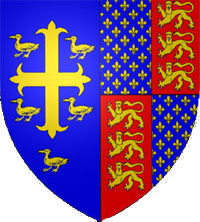 One of the more difficult passages to untangle in Richard II is found in Act II, Scene 1. Immediately following the death of the Duke of Lancaster, Richard announces that he’s claiming all of Lancaster’s property for himself in order to pay for the Irish wars:
One of the more difficult passages to untangle in Richard II is found in Act II, Scene 1. Immediately following the death of the Duke of Lancaster, Richard announces that he’s claiming all of Lancaster’s property for himself in order to pay for the Irish wars:
RICHARD And for these great affairs do ask some charge,
Towards our assistance we do seize to us
The plate, coin, revenues, and moveables
Whereof our uncle Gaunt did stand possess’d.
The Duke of York’s response is immediate:
YORK How long shall I be patient? Ah how long
Shall tender duty make me suffer wrong?
Not Gloucester’s death, nor Herford’s banishment
Not Gaunt’s rebukes, nor England’s private wrongs…
And he continues in this vein for 23 lines, laying out a point-by-point lamentation of Richard’s tyrannies, before at last exclaiming:
“Oh Richard: York is too far gone with grief,
Or else he never would compare between.”
And in response to this extraordinary tirade, Richard says:
RICHARD Why, uncle, what’s the matter?
It doesn’t seem to make much sense, and it causes York to deliver 22 lines in which he pleads with Richard to change his tune. Richard’s still having none of it when he responds:
RICHARD Think what you will, we seize into our hands
His plate, his goods, his money, and his lands.
York responds by leaving the stage and Richard moves on to formally announcing the beginning of his Irish campaign, going on to specify:
RICHARD And we create in absence of ourself
Our uncle York lord governor of England;
For he is just and always loved us well.
… wait a minute. Did Richard just watch the same scene we did?
It’s a challenge routinely faced by actors playing Richard II: How do you listen to York rant at you for 50+ lines and then act as if (a) you didn’t hear him and (b) it didn’t actually happen?
Many critics have judged Richard’s trust in York as an act of folly and point to this moment as proof of its foolhardiness. But there’s a rather large line between “making a mistake” and “being completely disconnected from reality to the point that it shatters the audience’s suspension of disbelief”, and Richard seems to be rather firmly crossing that line.
THE PUBLIC SOLILOQUY
When something doesn’t make sense to me in Shakespeare I find it helpful to assume that I’m the one making a mistake. Shakespeare wasn’t always perfect, of course, but I’ve often found it valuable to give him the benefit of the doubt and assume that I’ve either overlooked something or based my conclusions on a poor assumption.
Which brings us back to the root of the problem: How can Richard possibly hear everything York says and then respond the way he does?
Maybe he doesn’t.
One of the truths in working with a Shakespearean text is that most of the stage directions are missing. Even basic entrances and exits are often omitted, and finding a description of the internal action of the scene is a little like discovering buried treasure. Without those stage directions, we’re often left looking for clues in the text to guide our understanding of how a scene is supposed to be played.
So what if our common sense is misguiding us here? What if York isn’t talking to Richard (who just finished speaking), but to himself?
Saying, “Why, uncle, what’s the matter?” is absurd if you’ve just listened to York deliver a 23-line speech describing exactly what the matter is. But it’s completely different matter if you’ve suddenly become aware that your uncle is in some sort of distress on the opposite side of the stage.
First, is this staging possible? Yes. Richard has just issued a formal decree that Lancaster’s possessions are to be seized. It proved remarkably easy for Richard and his nobles to immediately “huddle up” to discuss the details of the plan, move up stage, and leave York alone to speak with the audience.
Second, is the staging plausible? In the case of Richard’s response, we can see that that this staging actually helps to make sense of his line. But is it consistent with what York is saying? This is a more complicated question. On the one hand, York begins by speaking of Richard in the third person (“… have ever made me sour my patient cheek or bend one wrinkle on my sovereign’s face”), which would be consistent with a soliloquy. But then he begins to speak in the second-person as if addressing Richard directly: “I am the last of noble Edward’s sons, of whom thy father Prince of Wales was first.” This language certainly leads one into the more traditional interpretation of direct confrontation. On the other hand, it’s not unusual for Shakespeare’s characters to address others rhetorically even when they aren’t available for a response. (For example, when Hamlet says, “Remember thee? Aye, thou poor ghost, while memory holds a seat in this distracted body.” We don’t need to assume that the Ghost didn’t actually exit several lines earlier, as indicated in the text, in order for the line to make sense.)
(In the rehearsal room we also experimented with York talking to someone other than Richard in a private conversation, but when we did we found the rhetorical device of referring to Richard in the second person without Richard being present stopped working. Not all experiments are destined to succeed.)
Third, are there any textual clues that strongly support our interpretation? Here we find nothing definitive, but in our exploration we spotted a few elements of the text which certainly proved very effective for our purposes.
For example, York closes his first speech by saying:
Oh Richard: York is too far gone with grief,
Or else he never would compare between.
Shakespeare’s “O” (or “Oh”) is generally a large moment. It’s an open syllable that can be easily extended to any length while allowing an actor to pour an immense amount of emotional content into it. If York is speaking to himself, then we need a large and clearly delineated moment at the end of his speech which can draw Richard’s attention from across the stage. And Shakespeare, in building York’s anguish to this “Oh”, has given us such a moment and coupled it directly to Richard’s name.
Richard’s line, of course, is the driving force behind our concept. And it is followed by the beginning of York’s next speech:
“Oh my liege, pardon me if you please; if not,
I please not to be pardon’d, am content with all:”
In general, one would expect to ask forgiveness for something already said or request pardon for something they about to say. It’s possible that York is trying to do both here, but it’s interesting how naturally this reads like a response to an honest question of concern from Richard. (“Since you’ve asked, I’ll tell you. But please forgive me for what I’m about to say.”) And perhaps some clue to its nature as preamble can be found in that colon which so neatly launches the actor into the speech to come.
In short, we found this approach extremely effective in the rehearsal room. In the process we began referring to it as a “public soliloquy” ““ a speech in which we find a character expressing their innermost thoughts using the same techniques as the soliloquy, despite the fact that they aren’t truly alone onstage. In doing so, we inadvertently unlocked a deeper understanding of the play as a whole: These public soliloquys can be found throughout the entirety of Richard II, often emphasizing a character’s frustration, impotence, or humiliation. Richard, in particular, engages in the act of public soliloquy frequently, but (as we can see here) he’s not the only one. (They even arguably manage to find their way offstage, if one interprets Bullingbrooke’s “Have I no friend will rid me of this living fear?”, reported by Sir Exton in Act V, Scene 5, as the public expression of a private thought.)
Thus, interpreting this passage as a public soliloquy not only helps to solve an immediate textual problem, but also proves to be consistent with both the theme and structure of the play as a whole.
Originally posted on September 28th, 2010.












